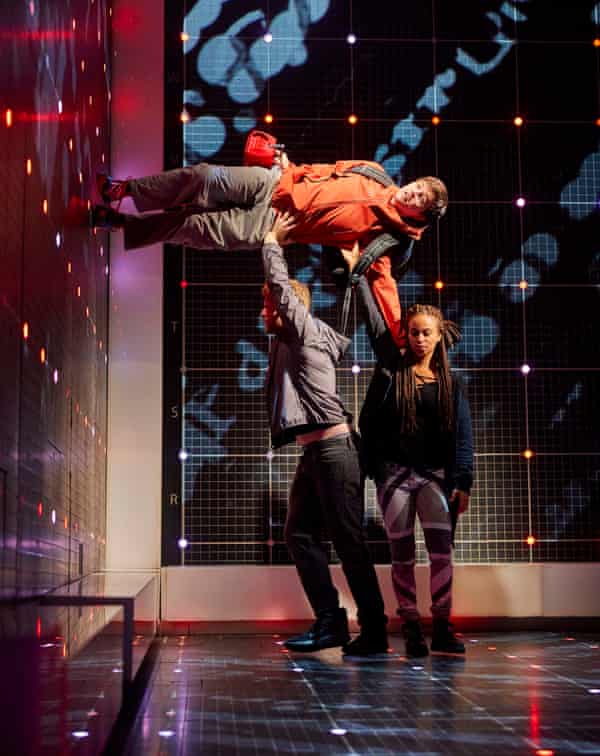The Curious Incident of the Dog in the Nighttime Broadway Review
T he Curious Incident of the Dog in the Night-Time is a bestselling novel that tells the story of Christopher Boone, a fifteen-yr-old male child who, afterward the vicious killing of his neighbour's canis familiaris, embarks on a investigation à la his hero Sherlock Holmes.
When it was first published in 2003, the book was promoted every bit a glimpse into Asperger's syndrome. Author Marker Haddon afterward disavowed the connection, perhaps because so many people with Asperger'due south objected to the portrayal of Christopher Boone.
Asperger's isn't mentioned in the novel itself: Christopher says he has "some behavioural difficulties". But his character adheres to some common ideas about neuratypical people that are consort in movies such equally Pelting Human being: he has unusual mental abilities (he can instantly count a herd of cows outside a railroad train window, and has a precocious mathematical power) and he's unsettlingly devoid of empathy for other people.
The National Theatre's stage adaptation is the Melbourne Theatre Visitor's headline human action for 2018. A lauded product that began in London'southward Cottesloe Theatre and ended up playing seasons in the Westward End and Broadway, it has been brought to Melbourne by the MTC and Arts Centre Melbourne.
A much beloved bestselling volume, adapted for the phase past a remarkable gimmicky playwright for the National Theatre. What could possibly go incorrect? As far as the rapturous opening night audience was concerned, not much. It was a hit before it even opened, with the entire season sold out.
The product is an artfully conceived and skilfully manifested adaptation, which remains, equally playwright Simon Stephens himself says, "loyal" to the book. This means that narrative and dialogue have been imported wholesale and given theatrical dress-ups. There's a strong current of sentimentality that makes this very much a story for those on the exterior looking in, which perhaps has been exaggerated by the crudities of adaptation to the stage.
Like the book, the production is ingeniously conceived. The voice of Haddon's narrator is vivid and intriguing, and the images interspersing the text have been translated past designers Bunny Christie (set), Paule Constable (lighting) and Finn Ross (video) into visual spectacle, with a set that combines projections, drawings and boxes that can be repurposed every bit different objects.

The cast consists of the four major characters, Christopher himself (Joshua Jenkins), his begetter Ed (David Michaels), his mother Judy (Emma Beattie) and his teacher Siobhan (Julie Hale), with all other characters played by the remaining half-dozen bandage members.
Marianne Elliott (as well the director of the striking National Theatre bear witness War Horse) creates a stylised performance that segues into concrete theatre or dance, choreographed past Frantic Assembly's Scott Graham and Steve Hoggett. Actors become props – doors, for example – in ways that irresistibly recalled theatre in pedagogy shows I saw in the 1990s. There's no denying it's well done, but equally a trope information technology likewise strikes me equally curvation, contributing to a cutely self-conscious charm that begins to grate early on on.
This stylisation creates a disconnect that exposes the emotional holes in the story. While the crude characterisations piece of work fine for the pocket-sized characters, such as headmistress Mrs Gascoyne (Amanda Posener), it creates a dilemma with the major characters around Christopher.
The audience is supposed to understand with his parents, Ed and Judy, who both struggle with the challenges of dealing with Christopher. Yet they are seldom more than speculative sketches, heavily relying on cliche: the inarticulate father struggling with his own emotional problems; the mother who runs off with her dodgy lover, unable to cope with her son.
Presumably the characters that surround Christopher Boone are seen through his subjectivity. As he's unable to perceive them except as gross caricatures, that is what they become: ciphers who represent diverse behavioural mysteries. This ways the emotional arc of the story is forced to rely on a heavy dose of sentimentality to power it by its more than questionable aspects. Nosotros observe some deeply disturbing things about Ed, for instance, which are glossed over with a moment of shameless audience-pleasing awwwww that substitutes for any actual resolution.
Emotional verity is by and large replaced past spectacle, and this is definitely a very pretty evidence. The design is at its most powerful when it conveys the panic of information overload when, for example, Christopher travels through the London Underground. Simply fifty-fifty the best effects dull with repetition, and repetition is built into the dramaturgy in ways that don't enhance it.
What interested me most about the production was its ingenious problem solving, but that's inappreciably ballast for an entire evening. I couldn't help wondering what it might have been similar had Simon Stephens been less loyal to the novel: the accommodation is effectively an animated volume, rather than a translation into theatre, and so plays heavily towards audience expectations rather than surprise. Merely perhaps a more radical adaptation might take alienated Haddon'south fanbase.
Source: https://www.theguardian.com/stage/2018/jan/17/the-curious-incident-of-the-dog-in-the-night-time-review-spectacle-devoid-of-emotional-verity
0 Response to "The Curious Incident of the Dog in the Nighttime Broadway Review"
Enregistrer un commentaire